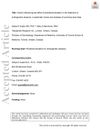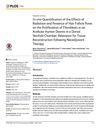 4 citations,
November 2020 in “BMC Dermatology”
4 citations,
November 2020 in “BMC Dermatology” Researchers identified genes in scalp hair follicles that may affect hair traits and hair loss.
 3 citations,
May 2023 in “Frontiers in immunology”
3 citations,
May 2023 in “Frontiers in immunology” Faulty inflammasome activation may lead to autoimmune skin diseases and could be a target for new treatments.
 3 citations,
November 2020 in “Curēus”
3 citations,
November 2020 in “Curēus” A child's hair loss from alopecia areata was fully reversed in five months using diet and supplements.
[object Object]  3 citations,
July 2017 in “Elsevier eBooks”
3 citations,
July 2017 in “Elsevier eBooks” Skin reactions are a common reason for emergency visits due to drug allergies, with some severe cases needing intensive care.
 3 citations,
December 2016 in “Sexual medicine reviews”
3 citations,
December 2016 in “Sexual medicine reviews” The document concludes that better research methods are needed in men's sexual health to provide stronger evidence and improve patient care.
 3 citations,
August 2011 in “Current Psychiatry Reviews”
3 citations,
August 2011 in “Current Psychiatry Reviews” Family-based treatment is the best outpatient care for stable teens with anorexia, and more research is needed on medication and treatment effectiveness for young people with eating disorders.
 3 citations,
April 2018 in “Therapeutic Delivery”
3 citations,
April 2018 in “Therapeutic Delivery” Hair follicle regeneration and delivery is complex due to many molecular and cellular factors.
 2 citations,
May 2023 in “Frontiers in immunology”
2 citations,
May 2023 in “Frontiers in immunology” Skin stem cells remember past inflammation, helping them respond better to future injuries and possibly aiding in treating skin issues.
 2 citations,
August 2020 in “Dermatologic Therapy”
2 citations,
August 2020 in “Dermatologic Therapy” Higher energy, longer exposure, and pulse irradiation improve hair density in androgenetic alopecia treatment.
 2 citations,
January 2018 in “Biology and medicine”
2 citations,
January 2018 in “Biology and medicine” High testosterone levels in 20% of the women studied may indicate PCOS, while 80% had low levels with potential health impacts.
 2 citations,
May 2015 in “PloS one”
2 citations,
May 2015 in “PloS one” Hair follicle pores help cell survival and growth, even after radiation.
 2 citations,
February 2014 in “Hair therapy & transplantation”
2 citations,
February 2014 in “Hair therapy & transplantation” Alopecia Areata is an autoimmune condition causing hair loss, influenced by genetics, environment, and possibly improved by anti-MIF therapy, with many patients experiencing regrowth within a year.
 1 citations,
March 2024 in “BioDrugs”
1 citations,
March 2024 in “BioDrugs” Biologics for severe asthma have known side effects, but some new risks need more study.
 1 citations,
August 2023 in “Frontiers in immunology”
1 citations,
August 2023 in “Frontiers in immunology” Traditional Chinese medicinal foods may help manage long-term post-COVID symptoms.
 1 citations,
August 2023 in “Acta dermato-venereologica”
1 citations,
August 2023 in “Acta dermato-venereologica” Corticosteroids are the most common treatment for alopecia areata, but many patients need better options.
 1 citations,
March 2023 in “bioRxiv (Cold Spring Harbor Laboratory)”
1 citations,
March 2023 in “bioRxiv (Cold Spring Harbor Laboratory)” NAC1 controls certain enzymes that reduce root hair growth in Arabidopsis.
 1 citations,
January 2023 in “In vivo/In Vivo”
1 citations,
January 2023 in “In vivo/In Vivo” Box A of HMGB1 can improve stem cell function, aiding anti-aging therapy.
 1 citations,
September 2022 in “JMIR dermatology”
1 citations,
September 2022 in “JMIR dermatology” Alopecia Areata greatly affects the quality of life and mental health of Canadian patients and their caregivers.

Using microneedling with PRP improves skin and hair conditions more than microneedling alone.
 1 citations,
April 2019 in “Clinical Breast Cancer”
1 citations,
April 2019 in “Clinical Breast Cancer” Medicines for enlarged prostate may raise the risk of breast growth and tenderness but not breast cancer.
 1 citations,
June 2018 in “Advances in Cosmetic Surgery”
1 citations,
June 2018 in “Advances in Cosmetic Surgery” PRP might help with hair growth and skin rejuvenation, but more research is needed to prove its effectiveness.
 1 citations,
January 2017 in “Expert opinion on orphan drugs”
1 citations,
January 2017 in “Expert opinion on orphan drugs” Adalimumab is the most effective treatment for severe hidradenitis suppurativa, but more research is needed to improve treatment options.
 1 citations,
August 2015 in “Current Sexual Health Reports”
1 citations,
August 2015 in “Current Sexual Health Reports” 5α-reductase inhibitors can cause serious and possibly lasting sexual and psychological side effects.
[object Object]  1 citations,
May 2009 in “Wiley-Blackwell eBooks”
1 citations,
May 2009 in “Wiley-Blackwell eBooks” Early treatment of PCOS in teens is crucial to prevent long-term health issues like diabetes and heart disease.
 1 citations,
January 2009 in “Elsevier eBooks”
1 citations,
January 2009 in “Elsevier eBooks” Anorexia Nervosa and Bulimia Nervosa are complex eating disorders with increasing incidence among young females, significant morbidity, and varying mortality rates, requiring more research for better treatment.
 December 2024 in “International Journal of Drug Delivery Technology”
December 2024 in “International Journal of Drug Delivery Technology” The new delivery method for dutasteride is more effective and has fewer side effects.
 April 2024 in “Cell death and disease”
April 2024 in “Cell death and disease” Long COVID causes various long-term health issues and needs better awareness and treatment.
 March 2024 in “Journal of Microbiology and Biotechnology”
March 2024 in “Journal of Microbiology and Biotechnology” Phloroglucinol may help improve hair loss by promoting hair growth and reducing oxidative stress.
 January 2024 in “Diabetes & metabolism journal”
January 2024 in “Diabetes & metabolism journal” Disrupting natural body clocks increases the risk of developing type 2 diabetes.
 December 2023 in “bioRxiv (Cold Spring Harbor Laboratory)”
December 2023 in “bioRxiv (Cold Spring Harbor Laboratory)” Aged individuals heal wounds less effectively due to specific immune cell issues.






























